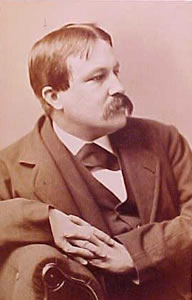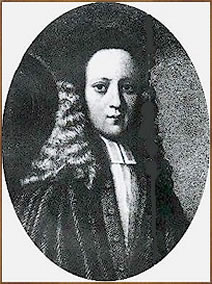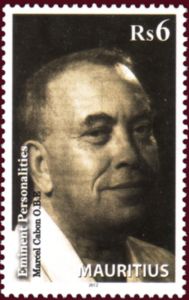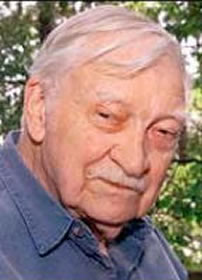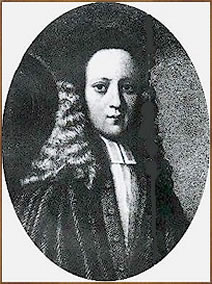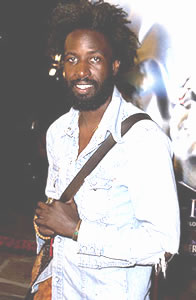De Amerikaanse dichter Robert Traill Spence Lowell werd geboren op 1 maart 1917 in Boston. Zie ook mijn blog van 1 maart 2007 en ook mijn blog van 28 februari 2008.
The Old Flame
My old flame, my wife!
Remember our lists of birds?
One morning last summer, I drove
by our house in Maine. It was still
on top of its hill –
Now a red ear of Indian maize
was splashed on the door.
Old Glory with thirteen stripes
hung on a pole. The clapboard
was old-red schoolhouse red.
Inside, a new landlord,
a new wife, a new broom!
Atlantic seaboard antique shop
pewter and plunder
shone in each room.
A new frontier!
No running next door
now to phone the sheriff
for his taxi to Bath
and the State Liquor Store!
No one saw your ghostly
imaginary lover
stare through the window
and tighten
the scarf at his throat.
Health to the new people,
health to their flag, to their old
restored house on the hill!
Everything had been swept bare,
furnished, garnished and aired.
Everything’s changed for the best –
how quivering and fierce we were,
there snowbound together,
simmering like wasps
in our tent of books!
Poor ghost, old love, speak
with your old voice
of flaming insight
that kept us awake all night.
In one bed and apart,
we heard the plow
groaning up hill –
a red light, then a blue,
as it tossed off the snow
to the side of the road.
Robert Lowell (1 maart 1917 – 12 September 1977)
De Amerikaanse dichter Richard Wilbur werd geboren op 1 maart 1921 in New York. Zie ook mijn blog van 1 maart 2007 en ook mijn blog van 28 februari 2008.
Matthew VIII,28 ff.
Rabbi, we Gadarenes
Are not ascetics; we are fond of wealth and possessions.
Love, as You call it, we obviate by means
Of the planned release of aggressions.
We have deep faith in properity.
Soon, it is hoped, we will reach our full potential.
In the light of our gross product, the practice of charity
Is palpably non-essential.
It is true that we go insane;
That for no good reason we are possessed by devils;
That we suffer, despite the amenities which obtain
At all but the lowest levels.
We shall not, however, resign
Our trust in the high-heaped table and the full trough.
If You cannot cure us without destroying our swine,
We had rather You shoved off.
Richard Wilbur (New York, 1 maart 1921)
De Afro-Amerikaanse schrijver Ralph (Waldo) Ellison werd geboren in Oklahoma City op 1 maart 1913. Zie ook mijn blog van 1 maart 2007.
Uit: Juneteenth
“Two days before the shooting a chartered planeload of Southern Negroes swooped down upon the District of Columbia and attempted to see the Senator. They were all quite elderly: old ladies dressed in little white caps and white uniforms made of surplus nylon parachute material, and men dressed in neat but old-fashioned black suits, wearing wide-brimmed, deep-crowned panama hats which, in the Senator’s walnut-paneled reception room now, they held with a grave ceremonial air. Solemn, uncommunicative and quietly insistent, they were led by a huge, distinguished-looking old fellow who on the day of the chaotic event was to prove himself, his age notwithstanding, an extraordinarily powerful man. Tall and broad and of an easy dignity, this was the Reverend A. Z. Hickman–better known, as one of the old ladies proudly informed the Senator’s secretary, as “God’s Trombone.”
This, however, was about all they were willing to explain. Forty-four in number, the women with their fans and satchels and picnic baskets, and the men carrying new blue airline take-on bags, they listened intently while Reverend Hickman did their talking.
“Ma’am,” Hickman said, his voice deep and resonant as he nodded toward the door of the Senator’s private office, “you just tell the Senator that Hickman has arrived. When he hears who’s out here he’ll know that it’s important and want to see us.”
Ralph (Waldo) Ellison (1 maart 1913 – 16 april 1994)
De Amerikaanse schrijver Steven Barnes werd geboren op 1 maart 1952 in Los Angeles. Zie ook mijn blog van 1 maart 2007.
Uit: Lion’s Blood
“SPRING’S FIRST DAY WAS A WARM SWEET SONG, a time of companionable silences and comfortably shared labor in Mahon O’Dere’s coracle. The boat’s round woven sides bobbed gently in the Lady’s arms. Aidan O’Dere, eleven years old and the crannog’s best swimmer, leaned against the coracle’s side, reveling in the river’s timeless flow. He studied the dark darting shadows of the fish as if they held the secrets of the universe, his mind alternately racing and utterly still.
Just now, his thoughts were of his father, Mahon, a lean, strong man weathered brown by sun and wind. He pulled the nets all day without tiring, best fisherman and fighter in the village bearing Aidan’s great-grandfather’s name. Father and son were sculpted from the same clay: blazing golden hair, crystal blue eyes, clean angled profiles. His father stood a head and a half taller and twice as broad across the shoulders, all of it good useful muscle and well-proportioned bone.”
Steven Barnes (Los Angeles, 1 maart 1952)
De Franse schrijver Jean-Edern Hallier werd geboren op 1 maart 1936 in Saint-Germain-en-Laye. In 1960 richtte hij met Philippe Sollers het tijdschrift Tel Quel op. Drie jaar later publiceerde hij zijn eerste roman “Les Aventures d’une jeune fille”. Vervolgens werkte hij als uitgever bij Plon. In 1967 verscheen zijn tweede roman “Le Grand écrivain”. Na de studentenopstanden van 1968 startte hij het linkse blad L’Idiot international. Hij had een tijd nauw contact met François Mitterrand, maar voerde later oppositie tegen hem en hij was het ook die dreigde het bestaan van diens buitenechtelijke dochter Mazarine Pingeot te onthullen.
Uit: Fax d’outre-tombe : Voltaire tous les jours 1992-1996
Lettre d’outre-vie à Jean-Edern Hallier
Cher Jean-Edern,
Tu as choisi la postérité contre la carrière et, tu le sais, seule la mort change la vie en destin.
1997-2007, dix ans déjà !
Tu as laissé derrière toi des dizaines de livres, des centaines d’articles, de discours, de poèmes, de tableaux; tu as posé ta belle voix de «gorge profonde» dans des milliers d’émissions de télévision, des centaines d’heures de radio ; tu as accumulé un trésor de mots, de fulgurances, de pensées neuves, de coups de foudre amoureux, de «misérables petits tas de secrets» aussi, comme tout un chacun ; en un mot, tu es devenu, en tes admirations pour quelques grands maîtres qui t’ont précédé, un «milliardaire de l’or du temps».
Tes amis s’en souviennent ! Les bons comptes font-ils toujours les bons amis ?
Qui n’a pas été insulté par Jean-Edern Hallier a-t-il seulement existé ? écrivait drôlement l’un d’eux.
Qui analyse le plus froidement la société de la fin du siècle dernier ne peut, hélas ou tant mieux, échapper à toi… Incontournable, d’aucuns ont fait de toi un nouvel élément, feu, terre, eau, air, mêlés en une boue sublime, ou une glaise, dont on peut faire les vases de Soissons de l’amitié comme de l’inimitié. Attention, fragile ! Danger ?
Jean-Edern Hallier (1 maart 1936 – 12 januari 1997)
De Amerikaanse dichter, schrijver en criticus William Dean Howells werd geboren op 1 maart 1837 in Martinsville, Ohio. Hij werd opgeleid tot letterzetter en leerde zichzelf tegelijkertijd vreemde talen. Daarnaast begon hij met het schrijven van gedichten en artikelen die hij publiceerde in de Ohio State Journal en de Atlantic Monthly. Een eerste succes behaalde hij met de buigrafie over de presidentskandidaat Abraham Lincoln. In 1871 werd Howells hoofduitgever van de Atlantic Monthly. Daarnaast bleef hij een uiterst productief schrijver
Uit: Boy Life (Earliest memories)
Some of my boy’s memories reach a time earlier than his third year, and relate to the little Ohio River hamlet where he was born, and where his mother’s people, who were river-faring folk, all lived. Every two or three years the river rose and flooded the village; and his grandmother’s household was taken out of the second-story window in a skiff; but no one minded a trivial inconvenience like that, any more than the Romans have minded the annual freshet of the Tiber for the last three or four thousand years. When the waters went down the family returned and scrubbed out the five or six inches of rich mud they had left. In the mean time it was a godsend to all boys of an age to enjoy it; but it was nothing out of the order of Providence. So, if my boy ever saw a freshet, it naturally made no impression[Pg 46] upon him. What he remembered was something much more important, and that was waking up one morning and seeing a peach-tree in bloom through the window beside his bed; and he was always glad that this vision of beauty was his very earliest memory. All his life he has never seen a peach-tree in bloom without a swelling of the heart, without some fleeting sense that
“Heaven lies about us in our infancy.”
William Dean Howells (1 maart 1837 – 11 mei 1920)
De Mauritiaanse dichter, schrijver en journalist Marcel Cabon werd geboren op 29 februari 1912 in Curepipe. Hij groeide op in het westen van het eiland. In 1931 verschenen zijn eerste gedichten. Hij werkte een tijd als journalist. Uit 1956 stamt zijn bekende epos Kélibé-Kéliba. Met zijn roman Namasté vestigde hij in 1965 definitief zijn naam in de literatuur.
Uit: Namasté
„Et tel était leur amour de la terre qu’une grande joie leur gonflait le cœur quand les cannes étaient mûres et que cent mille panaches fleurissaient la plaine, comme l’armée d’un maharajah.
Ces cannes fleurissaient parce qu’ils avaient défriché, pioché, sarclé, dépaillé — comme l’esclave, jadis —, parce qu’ils avaient donné leur sueur à cette terre qui n’était pas à eux, dont pas une parcelle ne serait peut-être à eux, malgré les rigueurs auxquelles ils s’astreignaient, malgré ces travaux de chaque heure et ce riz qu’ils se refusaient pour que le fils eût une case à lui …
Oui, combien de ces hommes n’avaient eu de terre (eux qui aimaient tant la terre !) que la fosse où on les avait couchés dans le langouti de tous les jours !
Mais y songeant et malgré la peine qui lui brûlait le cœur de tous ses souvenirs, Ram se disait que si chacun le voulait, une grande joie viendrait à tous les enfants de l’île d’aller ensemble sur les routes, de quelque sang qu’ils soient …
Les mauvais souvenirs, alors, ne seraient plus peut-être qu’un peu de poussière sous le pied …“
Marcel Cabon (29 februari 1912 – 31 januari 1972)
De Engelse dichter en vertaler John Byrom werd geboren op 29 februari 1692 in Manchester. Zie ook mijn blog van 29 februari 2008.
Come, Savior, Jesus, from above
Come, Savior, Jesus, from above!
Assist me with Thy heavenly grace;
Empty my heart of earthly love,
And for Thyself prepare the place.
O let Thy sacred presence fill,
And set my longing spirit free!
Which pants to have no other will,
But day and night to feast on Thee.
While in this region here below,
No other good will I pursue:
I’ll bid this world of noise and show,
With all its glittering snares, adieu!
That path with humble speed I’ll seek,
In which my Savior’s footsteps shine,
Nor will I hear, nor will I speak,
Of any other love but Thine.
Henceforth may no profane delight
Divide this consecrated soul;
Possess it, Thou Who hast the right,
As Lord and Master of the whole.
(Oorspronkelijk: „Venez, Jésus, mon salutaire”
door Antoinette Bourignon, vertaald door John Byrom)
John Byrom (29 februari 1692 – 26 september 1763)
Zie voor onderstaande schrijfster ook mijn blog van 1 maart 2007.
De Spaans-Amerikaanse schrijfster en dichteres Mercedes de Acosta werd geboren op 1 maart 1893 in New York.








